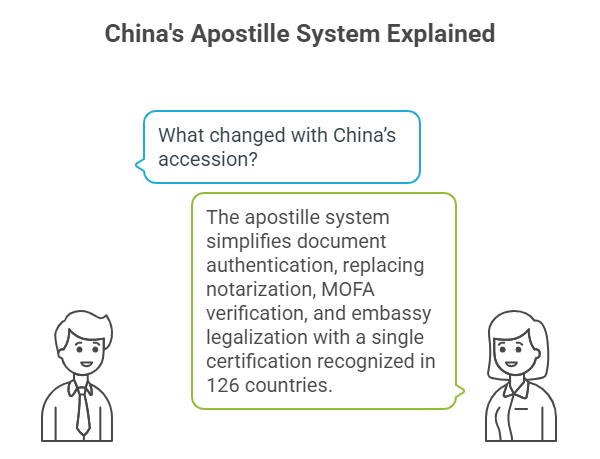China’s accession to the Hague Convention on November 7, 2023, fundamentally reshaped how foreign entities authenticate Chinese documents for international use. This landmark shift replaced the complex multi-step legalization chain with a streamlined apostille process – saving time, reducing costs, and eliminating bureaucratic hurdles for global businesses.

What Changed with China’s Accession?
Previously, authenticating a Chinese document like a business license or court ruling required:
- Local notarization
- Verification by the Chinese Ministry of Foreign Affairs (MOFA)
- Final legalization at the destination country’s embassy/consulate in China
This cumbersome process often took weeks or months. The apostille system collapses these steps into a single certification issued by designated Chinese authorities. Documents bearing this apostille certificate are recognized in all 126 member countries of the Hague Convention without further embassy legalization.
Documents Eligible for Apostille in China
- Corporate records (Articles of Incorporation, business licenses)
- Court documents
- Official government certificates (birth, marriage, death)
- Notarized affidavits and powers of attorney
- Academic diplomas from public institutions
- Patents and trademark certificates issued by CNIPA
Note: Documents issued by Macau, Hong Kong, and Taiwan follow separate procedures.
The Simplified Apostille Process: Step-by-Step
- Notarization/Local Certification: Public documents must be notarized by a Chinese notary office; government-issued papers (e.g., licenses) require certification from issuing authorities.
- Apostille Application: Submit documents to provincial Foreign Affairs Offices (FAOs) or MOFA in Beijing. Private documents like contracts may need prior notarization.
- Issuance: Authorities affix the apostille certificate (a stamped multilingual form) within 3-5 working days. No appointment is needed in most provinces.
Key Benefits for International Users
- 70%+ time reduction: Most apostilles are issued within a week
- Cost savings: Eliminates embassy fees (e.g., U.S. charges dropped from $50/page to $0)
- Reduced rejection risk: Standardized certificates minimize format errors
- Wider recognition: Valid across all Hague member countries
Critical Considerations
- Translation: Documents in Chinese must include a notarized English translation before apostille.
- Regional Variations: Shanghai and Zhejiang allow online applications; other provinces require in-person or mailed submissions.
- Validity: An apostille doesn’t expire, but relying parties may request recent documents.
Real Impact: A Case Study
A European pharmaceutical company reduced the authentication time for Chinese clinical trial permits from 31 days to 6 days post-accession, accelerating their product launch by 8 weeks. This efficiency is now the norm, not the exception.
Navigating Exceptions
While most Chinese documents qualify, certain categories still require traditional legalization:
- Commercial invoices or customs declarations
- Diplomatic/consular documents
- Documents for non-Hague countries (e.g., UAE, Canada)
China’s adoption of the apostille system removes a historic pain point in cross-border business. Understanding this simplified process empowers foreign entities to verify Chinese partners, enforce contracts, and expand operations with unprecedented speed. For companies handling frequent document authentication, partnering with a specialized service provider ensures compliance and efficiency in the new landscape. Explore our comprehensive Apostille Services for stress-free document legalization.
